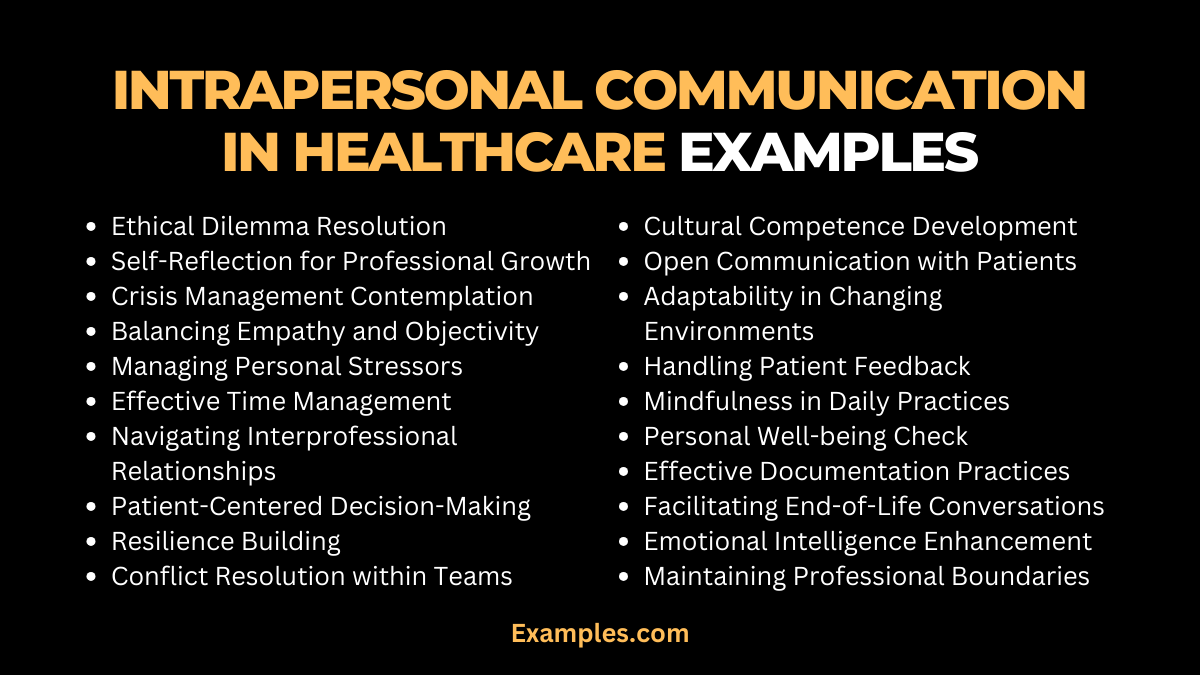19+ Intrapersonal Communication in Business Examples
Embark on a transformative journey into the realm of Intrapersonal Communication in Business with our comprehensive guide. Master the art of internal communication through practical examples and invaluable insights. Uncover the key strategies for enhancing collaboration, boosting productivity, and fostering a positive work culture. Elevate your professional communication skills and explore real-world Communication Examples that will empower you to navigate the intricate dynamics of business interactions with finesse and efficacy. Dive into this illuminating guide and revolutionize your approach to Intrapersonal Communication.
What is Intrapersonal Communication in Business?

Intrapersonal Communication in business refers to the internal dialogue and reflection that an individual engages in within a professional context. It involves self-awareness, self-talk, and the ability to understand one’s own thoughts and feelings. In essence, it’s the way individuals communicate with themselves, influencing their attitudes and decision-making within the business environment. This form of communication plays a pivotal role in personal growth, effective decision-making, and fostering a positive workplace culture. Explore the depths of Intrapersonal Communication for a clearer understanding of its significance in the business landscape.
What is the best Example of Intrapersonal Communication in Business?

Consider a scenario where a business leader faces a critical decision-making moment. In this instance of Intrapersonal Communication, the leader engages in a thoughtful internal dialogue, weighing pros and cons, assessing personal values, and aligning decisions with overarching business goals. This self-reflective process allows the leader to navigate complex situations with clarity and purpose, showcasing the power of Intrapersonal Communication in shaping strategic decisions. This example underscores how individuals, through effective internal communication, contribute significantly to the success and ethical standing of a business.
20 Intrapersonal Communication in Business Examples

Explore our curated list of 20 Intrapersonal Communication in Business examples that exemplify the art of internal dialogue for professional success. From decision-making prowess to fostering a positive work culture, these instances showcase the transformative impact of effective self-communication.
- Decision Crossroads: Boldly confront decision dilemmas through thoughtful self-dialogue, aligning choices with personal values and business objectives.
- Self-Motivation Mastery: Intrapersonal Communication fuels self-motivation; nurture inner dialogue that inspires resilience and achievement.
- Goal Alignment Reflection: Strategically align personal aspirations with organizational goals, ensuring a harmonious professional journey.
- Feedback Integration: Skillfully process feedback internally, leveraging it for continuous self-improvement and professional growth.
- Stress Coping Dialogue: Navigate stress by engaging in a constructive internal dialogue, fostering resilience and maintaining peak performance.
- Conflict Resolution Within: Resolve internal conflicts with finesse, promoting a harmonious and collaborative work environment.
- Ethical Decision Framework: Craft an ethical decision-making framework through mindful Intrapersonal Communication, ensuring integrity in every choice.
- Adaptability Reflection: Navigate change with adaptability, utilizing self-communication to embrace new challenges and opportunities.
- Leadership Self-Reflection: Leaders excel through introspective leadership, employing Intrapersonal Communication to refine their leadership style.
- Crisis Response Within: In times of crisis, leverage Intrapersonal Communication to maintain composure, make informed decisions, and lead effectively.
- Time Management Dialogue: Optimize time management by engaging in a reflective dialogue, prioritizing tasks and maximizing productivity.
- Team Collaboration Mindset: Foster a collaborative mindset through internal dialogue, enhancing teamwork and achieving collective goals.
- Innovation Inspiration: Spur innovation through creative self-dialogue, unlocking inventive solutions to business challenges.
- Feedback Integration Mastery: Master the art of integrating feedback through Intrapersonal Communication, fostering continuous improvement.
- Communication Style Calibration: Refine communication style by reflecting on personal preferences and adapting to diverse professional contexts.
- Strategic Planning Dialogue: Shape strategic plans by internally discussing long-term objectives, anticipating challenges, and optimizing outcomes.
- Employee Engagement Reflection: Boost employee engagement through thoughtful internal communication, fostering a positive workplace culture.
- Networking Confidence: Build networking confidence by engaging in positive self-talk, reinforcing professional strengths and accomplishments.
- Conflict Resolution Mastery: Navigate conflicts adeptly through internal dialogue, finding amicable solutions and preserving professional relationships.
- Leadership Vision Crafting: Craft a compelling leadership vision through Intrapersonal Communication, inspiring teams and driving organizational success.
Understanding the Essence: Involving internal dialogues and self-reflection, Intrapersonal Communication shapes decision-making, problem-solving, and professional conduct.
Navigating Decision-Making: A compass for choices, aligning personal values, goals, and ethics with organizational objectives.
Fostering Professional Growth: A catalyst for self-awareness, adaptability, and continuous improvement.
Building a Positive Workplace Culture: Cultivating collaboration, empathy, and effective conflict resolution.
Strategic Vision Alignment: Harmonizing individual visions with overarching strategic goals.
Enhancing Team Dynamics: Promoting self-awareness, understanding diverse communication styles, and fostering collaboration.
Adapting to Change: Equipping individuals to navigate change effectively and maintain focus on organizational goals.
Driving Ethical Practices: Shaping ethical decision-making through self-reflection and a culture of integrity.
Promoting Innovation: Encouraging self-dialogue, exploring new perspectives, and contributing inventive solutions.
Diversity and Inclusion: Aiding in understanding biases, fostering inclusivity, and promoting a culture that values differences.
Why is Intrapersonal Communication Important in Business?
Intrapersonal communication is the silent force that propels success within the business realm. This guide delves into the pivotal significance of cultivating effective internal dialogue for individual and organizational triumphs.
- Decision-Making Precision: Explore how Intrapersonal Communication aids in informed decision-making, aligning choices with personal values and organizational objectives.
- Leadership Excellence: Uncover the role of internal dialogue in shaping effective leadership, fostering self-awareness, and inspiring teams towards shared goals.
- Conflict Resolution Mastery: Delve into the importance of Intrapersonal Communication in navigating conflicts, maintaining professional relationships, and fostering a harmonious work environment.
- Cultural Impact: Understand how fostering a positive internal dialogue contributes to the creation and reinforcement of a healthy organizational culture.
- Professional Growth: Examine the link between Intrapersonal Communication and personal development, highlighting its role in continuous learning, adaptability, and resilience.
- Team Collaboration Dynamics: Discover how internal communication influences team dynamics, promoting collaboration, effective communication, and shared success.
- Ethical Decision Framework: Gain insights into how Intrapersonal Communication establishes a foundation for ethical decision-making, ensuring integrity in every professional choice.
- Motivational Catalyst: Unearth the transformative power of self-communication in maintaining motivation, resilience, and a positive mindset in the face of challenges.
- Strategic Alignment: Explore how aligning individual visions with organizational strategies through internal dialogue ensures a unified and forward-thinking approach.
- Overall Organizational Impact: Understand the ripple effect of individual Intrapersonal Communication on the broader organizational landscape, contributing to collective success and sustainable growth.
In conclusion, Intrapersonal Communication in business is the cornerstone for informed decision-making, fostering collaboration, and promoting professional growth. Through diverse examples and insights, this comprehensive guide has illuminated the transformative power of internal dialogue. Embrace Intrapersonal Communication to navigate challenges, cultivate positive workplace dynamics, and chart a course for success in the intricate landscape of business interactions.



